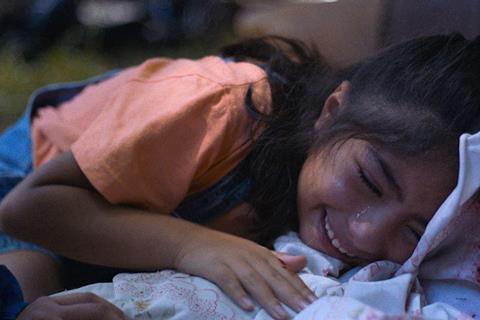Ernesto Martínez Bucio’s film bows in Berlin’s new Perspectives section

Dir: Ernesto Martínez Bucio. Mexico. 2024. 97mins
Formally challenging and imaginative, Ernesto Martínez Bucio’s debut The Devil Smokes (And Saves The Burnt Matches In The Same Box) is a darkly intriguing, elliptically told tale about five youngsters and their unstable grandmother who have locked themselves away from the outside world. Horror and fantasy tropes jostle anxiously against elements of psychological drama in this unsettling brush with the uncanny, though it can be wilfully vague. Potent atmospherics and stellar performances from its mainly sub-teen cast are the main takeaways from an item that should generate further festival interest following its appearance in the Berlinale’s new Perspectives section.
Potent atmospherics and stellar performances
The pre-title sequence shows hands in close-up creating a collage from torn-up family photos, an act of reconstruction that neatly mirrors the initial struggles of the viewer to make sense of the story’s fragments. It is the summer vacation sometime in the 1990s. Grandmother Romana (Carmen Ramos) is holed up in a rambling, ramshackle house in Mexico along with her five grandchildren,:Victor (Donovan Said) and Vanessa (Laura Uribe Rojas), who are a bit older than their siblings Elsa (Mariapau Bravo Avina), Marisol (Regina Alejandra) and tiny Tomas (Rafael Nieto Martinez). It takes us a little too long to separate them clearly from one another.
The children’s parents, nurse Judith (Micaela Gramajo) and Emiliano (Bernado Gamboa) appear only fleetingly. It seems that they have recently separated and Judith has left. One night, Judith, who is unwell, returns to the house to leave five sets of sports shoes for the children, and Emiliano sets off in pursuit of her. In the film’s present, we hear very little from either of them again.
Cold-hearted and remote, Romana, too, has issues. Paranoid about visitors, she has covered up the windows and mutters darkly to the children about how everyone who lives outside the house wants to tear it down, with all of them inside. It’s not the greatest atmosphere in which to raise a family, and the kids’ vivid imaginations duly go to work on it all, mentally mixing up their mother and the devil, and learning to be suspicious of the outside world.
Most of The Devil Smokes shows us how the childrens’ lives play out in this unhealthy, febrile atmosphere. At 12, Victor does his limited best to be the new head of the household; Tomas steals a basketball shirt from the washing line of a neighbour, with tragic consequences; Vanessa dreams of becoming a nurse like her mother. Things simmer down a little bit over the last half-hour, with the arrival of the police and social services.
The film is told in quasi-documentary style, with urgent, hand-held camera and tight close-ups that consistently withhold from us the wider view that might help us make sense of it all. The upside of this oblique approach is that it effectively renders the fragmentary, provisional nature of the children’s own experience of their distorted world; the downside is occasional viewer confusion.
It is interspersed with news clips about the impending visit of Pope John Paul II to the region – as per the title, whether it’s God or the devil who is running things is left open to question – as well as extended video footage of happier times for the family. (Sometimes this video footage is stopped and rewound.) One striking family video sequence has Judith cheerfully sending all the kids to bed, but then forgetting to turn the camera off and so accidentally recording herself breaking down in tears.
The formal experimentation of The Devil Smokes, is sometimes effective, sometimes not. It delivers most strongly in the oppressive atmospherics as Odei Zabaleta’s busy camera roams around the cluttered interiors of this shadowy house, taking us on a journey into a claustrophobic, dark little world from which we emerge, blinking and slightly traumatized, at the end.
The film’s other main strength is in the performances of the young cast, who are the film’s true heart. Superbly directed by someone who clearly respects and cares for each of them, the film takes us through their emotional journey from joy to utter heartbreak. Several scenes are painful for the young characters – presumably the ´burnt matches’ of the title – to live through, and they are just as emotional and raw for the viewer.
Production companies: Mandarina Cine
International sales: Bendita Film Sales sales@btafilms.com
Producers: Alejandro Duran, Gabriela Gavica, Carlos Hernandez Vazquez
Screenplay: Ernesto Martinez Bucio, Karen Plata
Cinematography: Odei Zabaleta
Production design: Ana J. Bellido
Editing: Ernesto Martínez Bucio, Karen Plata, Odei Zabaleta
Music: Emilio Hinojosa
Main cast: Carmen Ramos, Donovan Said, Mariapau Bravo Avina, Rafael Nieto Martínez, Regina Alejandra, Laura Uribe Rojas, Gamboa Bernardo, Micaela Gramajo















![[L-R]: Amanda Villavieja, Laia Casanovas, Yasmina Praderas](https://d1nslcd7m2225b.cloudfront.net/Pictures/274x183/6/4/1/1471641_pxl_20251224_103354743_618426_crop.jpg)









No comments yet